- Home
- Joel C. Rosenberg
Epicenter 2.0 Page 4
Epicenter 2.0 Read online
Page 4
A year later, Arafat was dead.
It happened November 11, 2004. I remember it distinctly, as I was in Turkey doing research for my next novel when I got a call from my publicist back in Washington. No sooner had news of Arafat’s death hit the wires than he had a stack of interview requests from radio talk-show hosts who had interviewed me when The Last Days was published. They were convinced the book was coming true and were curious to know what I thought would happen next.
What would the post-Arafat world look like? Could a moderate, pro-democratic, pro-Western leader now emerge, someone able and willing to make peace with Israel? Or would radical Islamic jihadists seize control of the West Bank and Gaza? Or were the Palestinians doomed to suffer a bloody civil war as various factions battled it out for supremacy?
I spent the rest of the day doing U.S. radio interviews from the phone in my hotel room, noting that any one of those scenarios was possible, but that the first thing to watch for was the outbreak of internecine violence and the emergence of an atmosphere of chaos.
In The Last Days, a fictional CIA expert sends a top-secret e-mail entitled “Possible Palestinian civil war erupting” to the president. He warns that the “battle to succeed Arafat could be brutal” and urges top administration officials to “watch for PLO factions to mobilize” against one another. As the novel unfolds, the warnings come to pass, top Palestinian officials are assassinated, and the West Bank and Gaza sink into anarchy.
Once again, fiction soon became fact. On November 14, the Associated Press reported that “militants firing assault rifles burst into a mourning tent for Yasser Arafat . . . just moments after the arrival of the Palestinian leader’s temporary successor, Mahmoud Abbas, forcing security guards to whisk him away to safety. The shooting, which killed two security guards and wounded six other people, raised grave concerns about a violent power struggle in the post-Arafat era.”32
The next day an Asian news service ran this headline: “Civil War Looms over Palestine after Arafat’s Death.” An Israeli news service ran a headline that read “Rival Gangs Violently Vie for Control in PA” [Palestinian Authority].33
By the end of the week, Palestinian prime minister Ahmed Qorei was demanding that “armed chaos must cease. Armed demonstrations must cease. Everybody must respect law and order.”34 But few were listening.
In the end, several years of chaos played into the hands of Hamas, which took over the Palestinian Authority in January 2006, not long after President Bush decided to make democracy in the Middle East the centerpiece of his second-term agenda.35
“A LITTLE EERIE”
My third political thriller was The Ezekiel Option.
Picking up where The Last Days left off, it centered on a dictator rising to power in post-Soviet Russia. Iran is feverishly trying to acquire nuclear weapons. Then Russia and Iran begin to form a military alliance—a nuclear alliance—with a coalition of Islamic countries who unleash an apocalyptic attack against Israel, bringing the world to the brink of nuclear war.
The Ezekiel Option was set for release on June 27, 2005, this time from Tyndale House Publishers. But Sean Hannity, who had asked me to be on his radio program the day it launched, as he had for both of my other novels, was leaving for vacation that week. He asked if I could reschedule the interview for Friday, June 24. Grateful for his continuing support, I readily agreed and we set the interview for 5:30 p.m. eastern. My public-relations team quickly booked additional radio interviews for me following Hannity, and Tyndale made June 24 the new official launch date. What caught everyone off guard, however, was the series of events that would unfold that particular day.
“It’s a little eerie, Joel,” Sean said as the interview began, noting that my past two novels had “run parallel with modern events” and that I was scaring him with the plotline of this new one. “So Saddam’s gone. Arafat’s dead. An American president and his advisors are pushing hard for an Israeli-Palestinian peace deal. All hell is breaking loose around the world, and a dictatorship begins rising out of Russia. Well, what’s the news about Vladimir Putin today?”36
Sure enough, just before we went on the air, Matt Drudge posted a link to a breaking Associated Press story out of Moscow: “Putin Amendment May Allow Third Term.”
According to the story, legislative allies of the Russian president were “considering an electoral amendment next week that could open the way for [Putin] to run for a third term, prompting the opposition to accuse his supporters of trying to cling to power.” The article went on to say that “speculation has been rife that Putin would seek to stay in power beyond 2008” and noted that “during his time in power, Putin has placed national television under effective state control, abolished the direct election of regional governors to make them virtual Kremlin appointees, and eliminated the right of independent lawmakers to run for parliament.”37
I summarized the AP story for the listening audience, then said, “You know, Sean, I was in Moscow last fall doing research for this novel, and I met with top Russian officials, U.S. Embassy officials, and Russian political analysts, and I asked them, ‘Do you believe that Putin is going to leave office in 2008?’ Every single one of them said yes—yet each of them had just spent the last hour convincing me of all the different things Putin was doing to consolidate power. Now, my character [in Option] is not Putin. But he feels like Putin, and I think there’s an interesting question whether Putin is really a friend of the United States. I know that President Bush has looked into his soul [and found him trustworthy]. I think, though, the president—to be fair—is reevaluating that right now because Putin has been allowing nuclear technology to be sold to Iran, the worst terror state on the planet.”
“Well, that’s part of your book, too,” Sean pointed out. “You write about a dictatorship rising in Russia and Iran feverishly pursuing nuclear weapons. . . . I don’t know where you get all this from. You’ve got, like, a blessing over your head because every time you write a book it just seems to fit in with modern events, and that happened with your last two novels and now it’s happening here.”
He was referring to the fact that on the exact same day, a radical Islamic hard-liner named Mahmoud Ahmadinejad had just won a landslide victory to become president of Iran, vowing to build a “powerful Islamic society,” defy Israel and the United States, and accelerate Iran’s bid to become a nuclear power.38 Western government officials and political analysts were both stunned and alarmed by Ahmadinejad’s rapid rise to power and the implications of his victory for regional security.39
But not the Kremlin. Putin immediately congratulated the new Iranian president-elect and said Moscow was eager to continue selling nuclear technology and research facilities to Tehran. “The construction of the Bushehr nuclear plant [in Iran] is near an end, and we are ready to continue cooperation with Iran in the nuclear energy sphere,” Putin said in a letter to Ahmadinejad released by the Kremlin, adding that the development of Russian-Iranian nuclear ties “contributes to global peace and stability.”40
SADDAM’S NOVEL, AND MINE
If all this were not “coincidence” enough for one day, a new story out of Amman, Jordan, suddenly popped up on the Associated Press wires with a headline that read “Novel Written by Saddam to Be Published.”41 Curious, I scanned the article and was stunned to learn that Saddam had actually finished writing a political thriller on March 18, 2003, just one day before coalition forces invaded Iraq.
To be sure, Saddam’s title was punchier than mine—Get Out, Damned One. But the parallels between our two novels were curious, to say the least. Not only had Saddam written about an apocalyptic war in the Middle East in which a coalition of Arab Muslims square off against the Jews and the Christians, but the central character of his novel was a Jew named Ezekiel, and the novel was coming out the same week as my own. “The story is apparently a metaphor about a Zionist-Christian plot against Arabs and Muslims,” noted the AP. “Ezekiel is meant to symbolize the Jews.”
Michael Reagan asked me about the
story when I appeared on his nationally syndicated radio show later that night. He had previously praised The Last Days, calling it “a gutsy new breed of political thriller— almost prophetically forecasting what you’ll read in tomorrow’s headlines.” But this was surreal. It was one thing to release a novel about the rise of a Russian dictator forming a nuclear alliance with Iran on the very day the world was discussing Vladimir Putin’s latest power grab and the election of an Iranian hard-liner vowing to go nuclear with Russian technology. But it was quite another thing to be publishing mirror-opposite novels with the likes of the Butcher of Baghdad.
FICTION OR REALITY?
I should note here that my novels do not precisely match the events that have actually unfolded in real life. While The Last Jihad, for example, does open with a kamikaze attack on an American city, my fictional terrorists use a private business jet rather than commercial jumbo jets, and they fly their murderous mission into Denver, not the World Trade Center or the Pentagon. Likewise, while The Last Days does open with the death of Yasser Arafat, in the novel he is assassinated, while in real life it is believed he died of natural causes. Moreover, in the novel, Mahmoud Abbas is assassinated as well, rather than succeeding Arafat as the head of the Palestinian Authority, as he did in real life.
That said, however, these and other differences between fact and fiction have not seemed to dampen people’s interest in my novels. To the contrary, each new political earthquake in the Middle East and Russia has spurred even more interest. By the end of 2005, I had given hundreds of media interviews. I had addressed audiences of CEOs, university students, church groups, and foreign diplomats in more than two dozen cities across the U.S., Canada, and the Middle East. I’d even delivered a talk on politics, prophecy, and the last days at the White House. And book sales soared.
When you write your first novel, you just hope your parents can find a copy at a bookstore within a hundred miles of their house. But suddenly there were more than one million copies of these novels in print. Thousands more were being printed in Holland, Poland, Portugal, Spain, and Turkey, with Hebrew, Russian, and Romanian editions in development. The books had spent month after month on the New York Times and USA Today best-seller lists.
“How are you doing this?” people wanted to know. “Is there a secret formula? Do you have a crystal ball? And what do you think is going to happen next?”
The Dallas Morning News called me “eerily prophetic.” A Washington Times profile said my novels felt “ripped from the headlines—tomorrow’s headlines.” A radio talk-show host in Las Vegas said, “Your books are amazing. They’re uncanny. It’s like you can predict the future. Could you come out to Vegas to do a book signing and then help people with the blackjack tables?” (I politely declined.) And nearly every radio host would begin the interview by citing the U.S. News & World Report story calling me a “modern Nostradamus.”
The truth, of course, is that I am neither a psychic nor a clairvoyant. I do not call Miss Cleo in the middle of the night to get my plot ideas. But it isn’t luck—dumb, blind, or otherwise. There is a reason these books seem to have predicted the future. There is a way to connect the dots, to anticipate future headlines, and in the chapters ahead, I will explain what is coming, how I know, and why it matters.
But first I want to share with you some background on how I was originally introduced to a 2,500-year-old prophecy that seems to be coming to fulfillment before our eyes.
CHAPTER TWO
THE GENESIS OF JIHAD
I met Natan Sharansky for the first time in New York City on the morning of September 11, 2000, one year to the day—indeed, almost to the hour—before America was attacked by the forces of radical Islam. Neither of us had any specific idea of what horrors lay ahead, but it was that meeting and what he would share with me over the next few days that set the Last Jihad series into motion.
Two months earlier, Sharansky had been one of the top officials in the Israeli government. But on July 9—the eve of the Middle East Peace Summit that President Clinton had convened at Camp David—Sharansky resigned as Israel’s interior minister, a move that threatened to bring down the government of then–prime minister Ehud Barak. At the time, the world was beginning to wonder if a final settlement between Israel and the Palestinians might actually be at hand. Top Clinton aides certainly hoped so and were doing everything they could to make it possible. But Sharansky had serious reservations.
For one thing, Barak was keeping the full details of his own peace plan secret even from members of his own cabinet, raising serious questions about what the prime minister’s ideas for achieving peace actually were. For another thing, what tidbits were known were disturbing, to say the least.
Rumors (which later proved to be true) were flying that Barak was poised to give away all of Gaza, 90 percent or more of the West Bank, and half the Old City of Jerusalem—including the Temple Mount—to the terrorist leader Yasser Arafat for the creation of a Palestinian state. Yet Sharansky saw no indications that Barak would insist upon enforceable security guarantees to protect the Israeli people from terrorist attacks, much less insist that the Palestinians embark upon true democratic reforms or start protecting the human rights of its own people, including moderate Muslims or evangelical Palestinian Christians, long the brunt of severe persecution under the Arafat regime.
Sharansky was certainly on record as being in favor of making painful choices if a serious peace deal could be struck with the Palestinians. But he now argued that Barak’s plan (as much of it as was known) gave away too much, too fast, to the wrong partner, and under the wrong conditions, and he had asked me over the phone to help him make his case to the American people.
Sharing his convictions and impressed with his courage, I immediately agreed and began helping him and his team place op-eds in the New York Times, the Wall Street Journal, and the Washington Post; issue press releases; book English-language TV and radio interviews for him and his surrogates to do from Jerusalem; and answer questions for American print journalists covering the day-to-day machinations of the Camp David summit.42
Whatever momentum Clinton and Barak had going into the summit, Sharansky’s resignation brought it screeching to a halt, as did the resignation of two other Israeli political parties that had been part of Barak’s coalition. On top of that, Israeli foreign minister David Levy made the stunning announcement that he would not be traveling with the prime minister to Camp David, as a protest against Barak’s expected sweeping and ill-considered concessions.
“Barak’s Coalition Crumbles on Eve of Summit Talks” read the front-page New York Times headline on the morning of July 10. Once again, the Holy Land and the Holy City were at the epicenter of an international media storm, and a Newsweek cover story perfectly captured the drama of the moment: “The Fate of Jerusalem: Inside the Fight over a Sacred City’s Future.”43
For the next fifteen days, I helped Sharansky and his colleagues respond to a torrent of media requests and explain to the American people and particularly to evangelicals and the Jewish community why Barak’s plan to divide Jerusalem and create a new terror base camp for the likes of Yasser Arafat was a grave mistake.
The summit collapsed on July 25 without a deal, and Sharansky asked me to issue the following statement to all American reporters, producers, and editorial writers covering the peace talks: “I will be very happy to see a peace agreement signed between Israel and the Palestinians. However, under today’s conditions, the agreement that would have been reached at Camp David would have torn Israeli society apart from the inside and would have been disastrous for Israel’s national interests.”44
Our work had only just begun. The summit itself was over, but the feverish Clinton-Barak bid to get a deal with Arafat—seemingly at all costs—before President Clinton left office was far from over. Sharansky asked me to set up a three-day media tour through New York and Washington so he could press his case in person, as well as announce the formation of a new organization—On
eJerusalem.org—dedicated to rallying international support for keeping Jerusalem the undivided capital of the Jewish state. Again, I readily agreed. After all, I not only shared his objectives, I was also looking forward to finally meeting this political maverick, for despite all the work we had been doing together over the past ten weeks or so, we had still spoken only by phone.
Thus, at just before 9 a.m. on September 11, 2000, I was picked up from my hotel in Manhattan and driven to the Harvard Club, where Sharansky and several of his colleagues were having breakfast.
My excitement grew during the drive. After more than a decade working in Washington, I had yet to meet anyone with a more remarkable personal story than Natan Sharansky. Born into a secular Jewish family in Soviet Russia during the coldest years of the Cold War, Sharansky had been trained as a computer scientist but quickly shifted gears and became internationally known as a human-rights activist after being denied an exit visa to Israel. Arrested by the KGB and falsely accused of high treason and collaborating with the CIA, he was sentenced to thirteen years of solitary confinement and hard labor in the Soviet concentration camps known as the Gulag.
Miraculously released in February 1986 after nine years—the first political prisoner ever released by Mikhail Gorbachev (under intense pressure from Ronald Reagan)—Sharansky immediately emigrated to Israel, where he wrote his memoir, Fear No Evil. He became an internationally recognized champion of democracy and freedom and was awarded the U.S. Congressional Gold Medal. Not content to fritter away his own freedom, however, he went on to launch the first Israeli political party for Soviet Jews, and by 1996—ten years after he was released by the KGB—Sharansky was elected to the Israeli parliament, where he would eventually rise to become deputy prime minister, the second-highest-ranking official in the Israeli government.

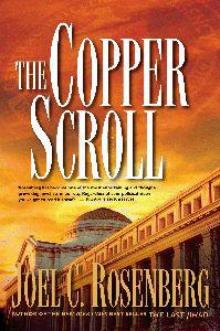 The Copper Scroll
The Copper Scroll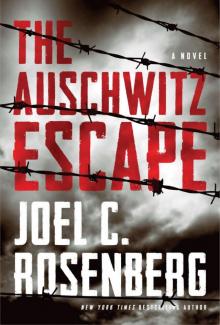 The Auschwitz Escape
The Auschwitz Escape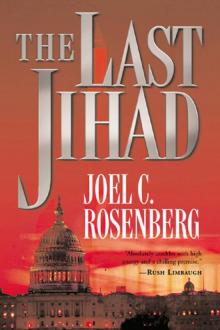 The Last Jihad
The Last Jihad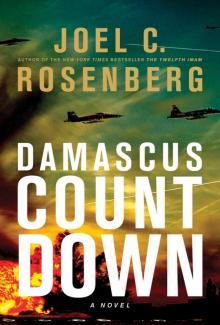 Damascus Countdown
Damascus Countdown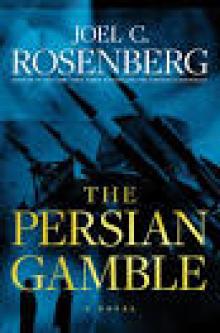 The Persian Gamble
The Persian Gamble The Jerusalem Assassin
The Jerusalem Assassin Dead Heat
Dead Heat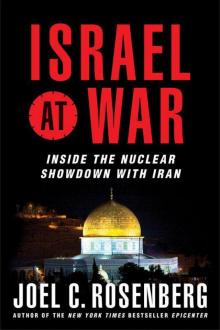 Israel at War: Inside the Nuclear Showdown With Iran
Israel at War: Inside the Nuclear Showdown With Iran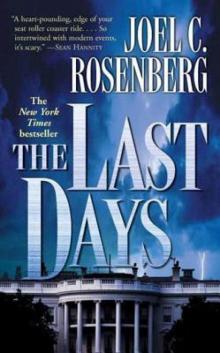 The Last Days
The Last Days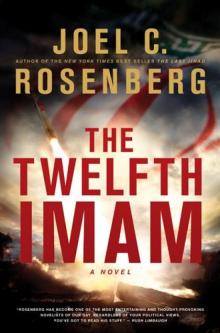 The Twelfth Imam
The Twelfth Imam Epicenter 2.0
Epicenter 2.0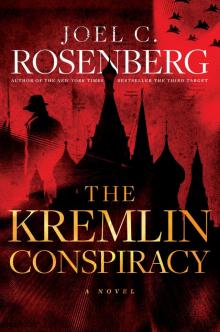 The Kremlin Conspiracy
The Kremlin Conspiracy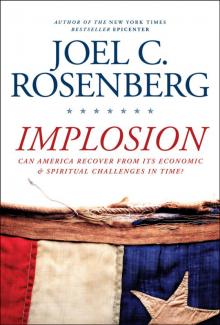 Implosion: Can America Recover From Its Economic and Spiritual Challenges in Time?
Implosion: Can America Recover From Its Economic and Spiritual Challenges in Time?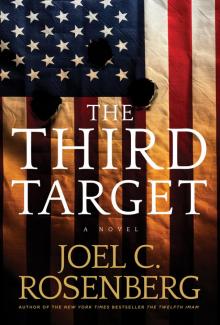 The Third Target: A J. B. Collins Novel
The Third Target: A J. B. Collins Novel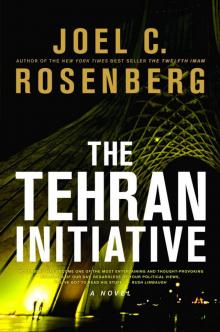 The Tehran Initiative
The Tehran Initiative Inside the Revolution
Inside the Revolution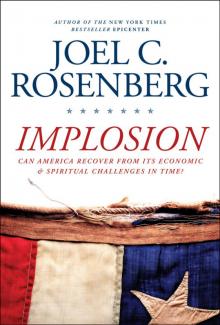 Implosion
Implosion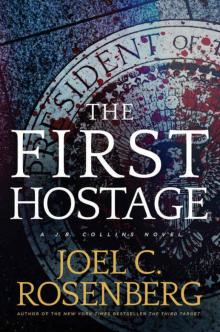 The First Hostage: A J. B. Collins Novel
The First Hostage: A J. B. Collins Novel